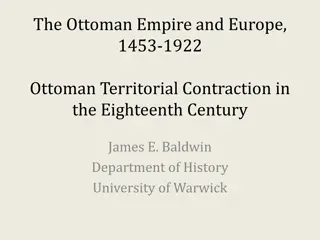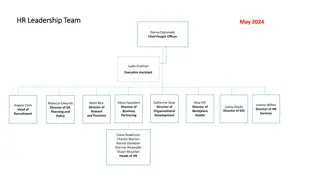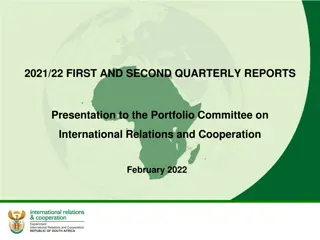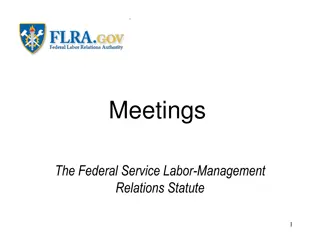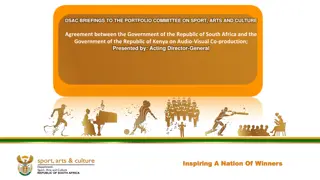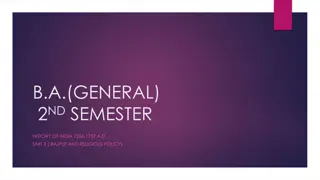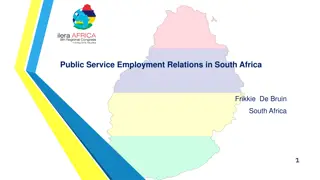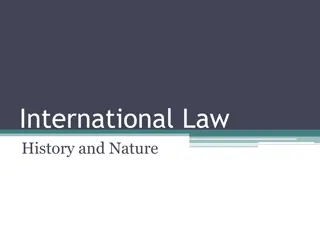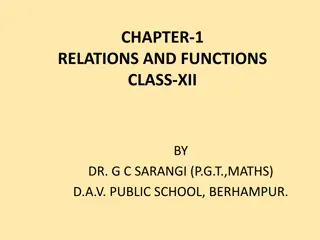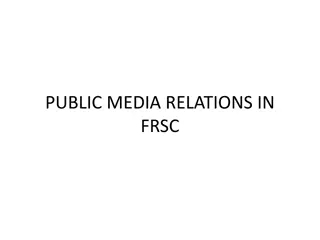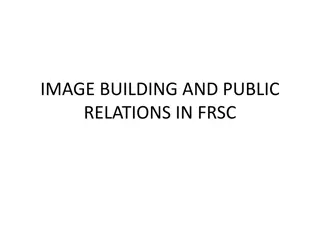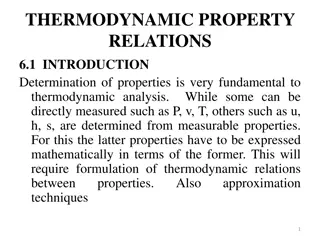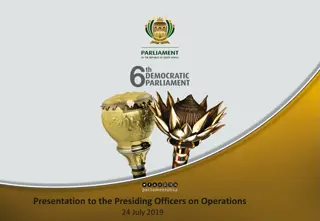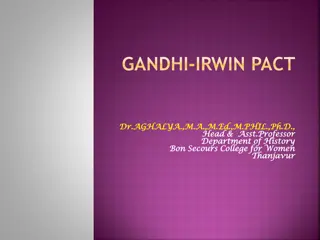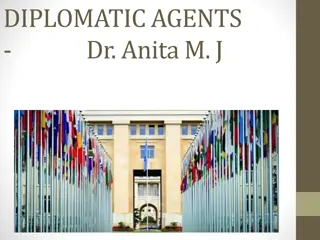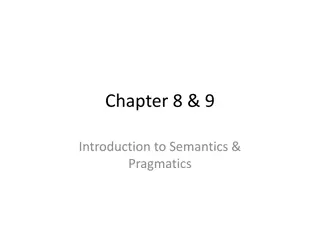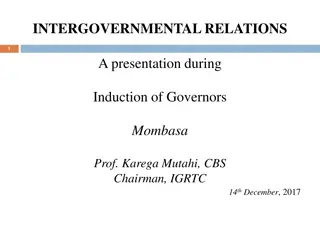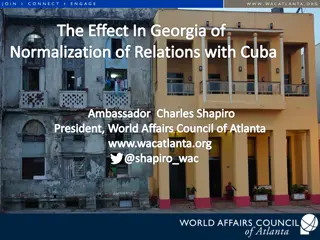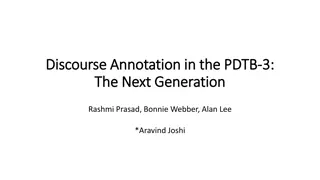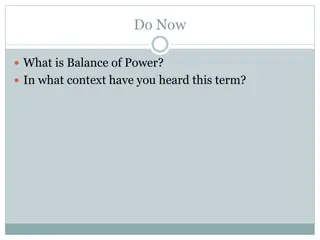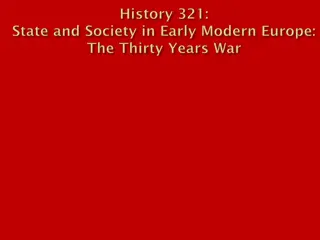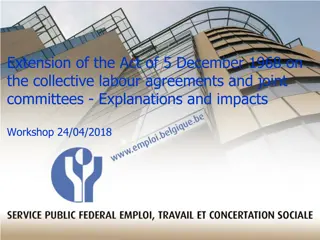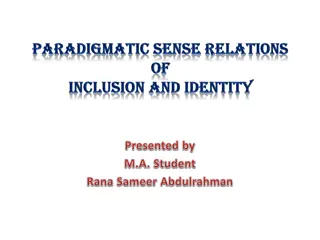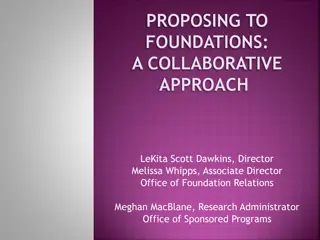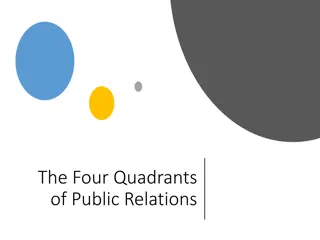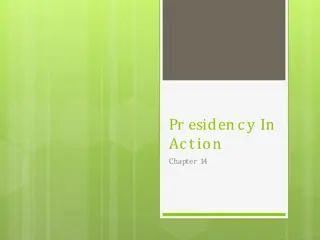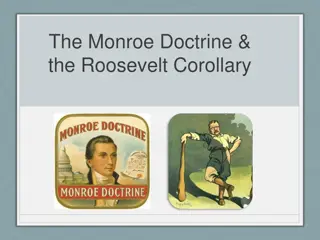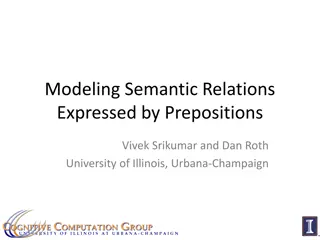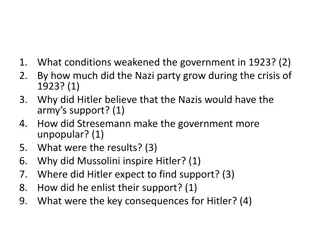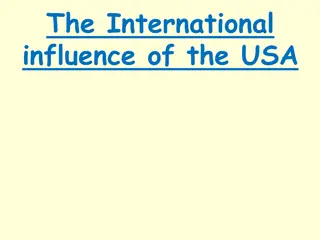Understanding International Relations Perspectives on Complex Global Issues
International Relations is a crucial field of study that delves into how countries and global actors interact, exploring diplomacy, trade, conflict, cooperation, and more. This scenario focuses on foreign policy relations between states, NGOs/humanitarian efforts, and transnational issues, highlight
1 views • 14 slides
Ottoman Empire Territorial Contraction in the 18th Century
Ottoman Empire faced agricultural and fiscal crises in the 17th century, leading to internal rebellions. However, by the mid-17th century, the empire had recovered and experienced further expansion, albeit at a slower rate compared to the previous century. In the 18th century, the Ottomans suffered
2 views • 12 slides
HR Leadership and Employee Relations Team Overview
Meet the dedicated leaders of the HR team, including the Chief People Officer, Directors, and Heads of various departments. Explore the Employment Policy and Strategy team responsible for employee relations and strategic projects. Learn about the Employee Relations team managing important aspects of
1 views • 9 slides
DIRCO's 2021/22 International Relations Quarterly Reports Overview
DIRCO's 2021/22 first and second quarterly reports presented to the Portfolio Committee on International Relations and Cooperation in February 2022 highlight the impact of the COVID-19 pandemic on diplomatic operations worldwide. Emphasis is placed on bilateral engagements, economic diplomacy initia
0 views • 48 slides
Understanding Formality in Meetings under the Federal Service Labor-Management Relations Statute
The Federal Service Labor-Management Relations Statute provides guidelines for formal discussions and investigative examinations in the context of labor relations. It outlines the rights of unions to representation in formal meetings, emphasizing the importance of subject matter and formality. The d
0 views • 34 slides
Audio-Visual Co-production Agreement Between South Africa and Kenya
South Africa and Kenya signed an Audio-Visual Co-production Agreement aimed at enhancing cultural relations and collaboration in the audio-visual industry. The agreement, signed in Nairobi, outlines a validity period and termination process, emphasizing a commitment to mutual projects. Diplomatic re
1 views • 13 slides
Rajput and Religious Policy of Mughal Emperors: Akbar vs. Aurangzeb
Akbar, the first Mughal emperor, pursued a diplomatic policy towards the Rajputs, aiming to bring them under his suzerainty while maintaining friendly relations. His successor, Aurangzeb, adopted a more aggressive approach, seeking to annex Rajput kingdoms due to religious differences. This shift in
0 views • 6 slides
Public Service Employment Relations in South Africa: Overview
The South African public service employment relations are governed by various acts including the Labour Relations Act, Basic Conditions of Employment Act, and others. The legal framework emphasizes collective bargaining, with the Public Service Coordinating Bargaining Council playing a key role. The
0 views • 17 slides
BSc in Strategic Studies & International Relations at KDU
The Faculty of Defence and Strategic Studies at KDU offers a hybrid BSc degree in Strategic Studies and International Relations to prepare skilled professionals in national security and foreign relations. The program aims to develop theoretical and research skills for analyzing international politic
0 views • 8 slides
Understanding International Law: Origin, Definition, and Application
International law governs relations between independent states and entities, encompassing various fields like armed conflict, human rights, and diplomatic relations. It is a combination of rules and customs, with states as primary subjects. Private international law addresses legal issues with forei
1 views • 68 slides
Understanding Relations and Functions in Mathematics
This chapter explores various types of relations and functions, including empty and universal relations, equivalence relations, and common errors in understanding symmetry. It also delves into the concept of reflexivity, symmetry, and transitivity in relations, with practical examples provided for b
1 views • 16 slides
Cultural Exchanges Between Japan and Tang China: A Historical Perspective
Explore the rich history of cultural exchanges between Japan and Tang China, from diplomatic relations to technological advancements. Discover the influence of Chinese culture on Japan, the heyday of cultural exchanges, and the impact of militarism on the relationship. Witness the evolution of frien
0 views • 7 slides
Public and Media Relations in FRSC
This presentation discusses the importance of maintaining healthy public and media relations in the Federal Road Safety Corps (FRSC) in Nigeria. It outlines the objectives, functions, and activities of public relations within the organization, emphasizing the need for effective communication and ima
2 views • 23 slides
Role of Public Relations in Image Building for FRSC
Explore the crucial role of effective public relations in enhancing the corporate image of the Federal Road Safety Corps (FRSC). The paper discusses the importance of public perception and how it influences FRSC's operations, alongside objectives such as defining public relations, highlighting the v
2 views • 19 slides
Fundamentals of Thermodynamic Property Relations
Determining thermodynamic properties is crucial for analysis, involving direct and derived properties expressed through formulations and relations. Partial derivatives, fundamental relations like the 1st and 2nd laws, and functions such as enthalpy, Helmholtz, and Gibbs are explored. Maxwell relatio
1 views • 56 slides
International Relations and Protocol Division Presentation to Presiding Officers on Operations
The International Relations and Protocol Division (IRPD) was established in 2010 to enhance Parliament's international relations capacity and strategic objectives. The division focuses on improving parliamentary international engagement, providing advisory services, managing logistical operations, c
0 views • 22 slides
Gandhi-Irwin Pact and Its Significance in Indian History
The Gandhi-Irwin Pact, signed in 1931, was a pivotal moment in India's independence movement. It marked a shift in British-Indian relations and led to the withdrawal of civil disobedience movements. The pact included agreements on the Round Table Conference, withdrawal of ordinances, prosecution, an
0 views • 11 slides
Equivalence Relations and Partition Induced Relations
The concept of equivalence relations and partition-induced relations on sets are explored. Equivalence relations satisfy reflexivity, symmetry, and transitivity, making them important in various mathematical contexts. The relation induced by a partition of a set is shown to be an equivalence relatio
0 views • 24 slides
Understanding the Role and Importance of Diplomatic Agents
Dive into the world of diplomatic agents, exploring their history, classification, immunities, and privileges. Learn about the Vienna Convention on Diplomatic Relations, theories governing diplomatic relations, and the critical role these agents play in modern international affairs.
0 views • 17 slides
Understanding Semantic Relations in Language
In semantics and pragmatics, sense relations are categorized into paradigmatic, syntagmatic, and derivational axes. Paradigmatic relations involve semantic choices within a sentence structure, while syntagmatic relations connect items within the same sentence. Examples include synonymy, hyponymy, me
0 views • 33 slides
Understanding Intergovernmental Relations in Kenya
Intergovernmental Relations (IGR) in Kenya involve interactions between government entities within a decentralized system. This presentation outlines the institutional framework, disputes, progress of audits, and assets/liabilities in IGR. It emphasizes the importance of statutory and non-statutory
2 views • 44 slides
Effect of Normalization of Relations with Cuba on Georgia
The normalization of relations with Cuba has had significant effects in Georgia, particularly in terms of diplomatic relations, trade embargo laws, and trade relations. This includes a look at the naming of ambassadors, the importance of diplomatic relations, trade restrictions with various countrie
0 views • 8 slides
Understanding Logical Relations in Programming Languages
Explore the concept of logical relations in programming languages, focusing on the relation between high-level and low-level programs. Learn about contextual equivalence, its benefits and limitations, and how logical relations offer a robust framework for defining program equivalence. Discover why l
0 views • 18 slides
Understanding Discourse Coherence and Annotation in PDTB
NLP research on discourse coherence explores relations between events and propositions expressed in text, with a focus on combining individual relations into complex coherence structures. The PDTB approach annotates low-level relations in corpora to derive emergent high-level structural representati
0 views • 40 slides
Understanding Balance of Power in 18th Century Europe
Balance of power in 18th-century Europe was a concept where great powers aimed to maintain equilibrium to prevent one nation from becoming too powerful. This balance was evident in events like the War of the Austrian Succession and the Diplomatic Revolution of 1756, which reshaped alliances and riva
0 views • 13 slides
Ecuadorian Diplomatic Crisis: The Raid on Mexico's Embassy and Its Global Impact
Ecuadorian police raid Mexico's embassy in Quito, arresting former Vice-President Jorge Glas. Mexico grants him asylum, leading to a diplomatic standoff. The incident reflects political tensions between the countries and raises concerns about adherence to diplomatic norms. Regional powers condemn Ec
0 views • 5 slides
Political and Diplomatic Developments of the 1620s
The 1620s were marked by key political and diplomatic developments including the issuance of the Edict of Restitution by Ferdinand II in 1629. Warfare financing, military conflicts, and the revival of Catholicism in the Empire stirred mixed reactions from France and Spain. The era also saw significa
0 views • 28 slides
Understanding the Extension of the Act of 5 December 1968 on Collective Labour Agreements
Exploring the extension of the Act of 5 December 1968 on collective labour agreements and joint committees, this workshop delves into its scope, importance of joint committees, and exceptions such as diplomatic missions. The Act applies to private sector employers, workers, and specified Belgian pub
0 views • 28 slides
Understanding Sense Relations in Linguistics
Sense relations play a crucial role in linguistics, influencing the significance and connection between words. Various aspects such as recurrence, discrimination, lexicalizability, abstract vs. concrete relations, multiple simultaneous relations, and the entities involved characterize sense relation
0 views • 17 slides
Collaborative Approach to Foundation Relations
Collaborative approach to foundation relations involves learning, advancing priority projects, building relationships, facilitating linkages, and providing support for funded projects. It assesses project suitability, targets proposals, shares information, facilitates interdisciplinary proposals, an
0 views • 18 slides
Understanding the Four Quadrants of Public Relations
Public relations professionals engage in various relationships including internal, external, personal, and community interactions. The four quadrants of PR include Media, Community, Business, and Government relations. Each quadrant encompasses specific responsibilities and strategies such as managin
0 views • 8 slides
Understanding Presidential Powers in the United States
The content discusses various powers of the President of the United States, including oath of office, executive orders, appointment power, removal power, diplomatic and military powers, treaties and agreements, commander-in-chief role, and legislative and judicial powers. It covers aspects like maki
0 views • 12 slides
The Monroe Doctrine and the Roosevelt Corollary: Evolution of US Foreign Policy
The content explores the historical context and evolution of US foreign policy through the Monroe Doctrine of 1823 and the Roosevelt Corollary of 1904. It discusses the principles outlined in each doctrine, their implications on US interactions with other nations in the Western Hemisphere, and the s
0 views • 4 slides
Italian Foreign Policy in the Abyssinian War and its Aftermath
The Abyssinian War and its aftermath in the Middle East are explored through the lens of Italian foreign policy. The Mussolini-Laval Agreements of January 1935, the Anti-British line in the summer of 1935, and the Anglo-Italian rivalry all played significant roles in shaping events. Britain sought s
0 views • 28 slides
Semantic Relations Expressed by Prepositions in Modeling Study
Explore the study on modeling semantic relations expressed by prepositions conducted by Vivek Srikumar and Dan Roth from the University of Illinois, Urbana-Champaign. The research delves into prepositions triggering relations, ontology of preposition relations, examples of preposition relations, pre
0 views • 25 slides
Evaluating Weimar Germany's Recovery Period 1924-1929
The period of Weimar Germany from 1924 to 1929 witnessed economic, diplomatic, and political recovery under the leadership of Stresemann. The strengths included growth in industries, resolution of the reparations issue, and improved working conditions. However, challenges such as budget deficits, de
0 views • 15 slides
Understanding Employee Relations in Academic Institutions
Employee relations in academic settings involve managing relationships between employers and employees, ensuring fair treatment, resolving issues, and minimizing risks. Academic Employee Relations Analysts play a crucial role in labor relations, grievance handling, and policy development. Key aspect
0 views • 10 slides
Understanding the International Influence of the USA
Explore the extensive international influence of the USA, focusing on its role in global organizations, relationships with other world powers, economic and military impact, membership in international bodies, involvement in recent conflicts, and diplomatic relations. Learn about the significance of
0 views • 69 slides
Replace or Modify Diplomatic, Consular, or International Organization ID Cards Guide
Learn how to replace or modify lost or damaged Diplomatic, Consular, International Organization, or Special ID cards. Follow a simple process including logging in, selecting the replacement option, filling a form, uploading documents, and awaiting confirmation. The Mission will notify you once the n
0 views • 5 slides
Cold War Development to 1968
The Cold War escalated from the US providing support to countries threatened by communist expansion to the Soviet Union's policy of peaceful co-existence in the 1950s under new leadership like Nikita Khrushchev. Tensions rose with issues like Berlin becoming a free city proposal. The period also saw
0 views • 8 slides

